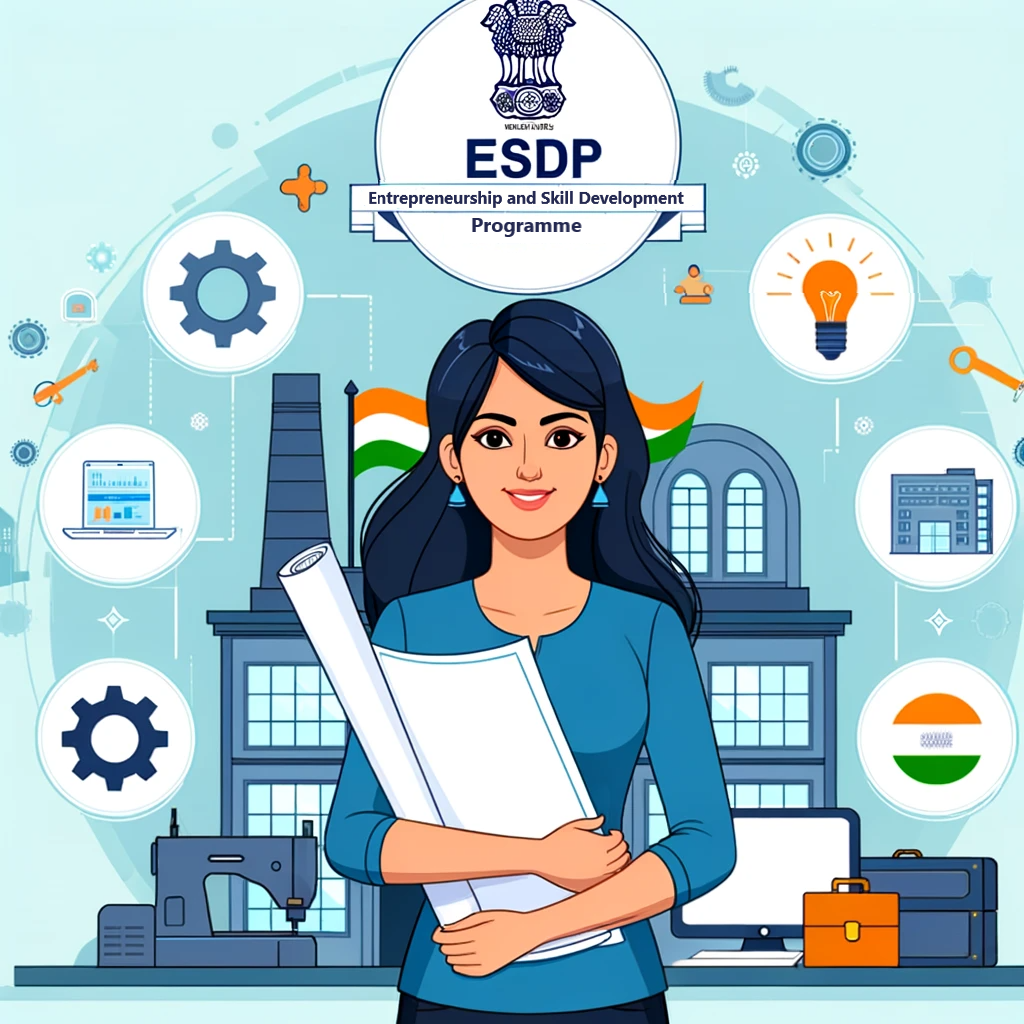From Zero to Hero: How ESDP Transforms Ordinary Folks into Entrepreneurs

The Ministry of Micro, Small, and Medium Enterprises (MSME) developed the Entrepreneurship and Skill Development Programme (ESDP) to assist current and aspiring entrepreneurs in India in developing entrepreneurial skills and competencies. It is one of many programs launched by the M/o MSME to increase young people's ability to take risks and develop successful businesses across the country. The initiative encompasses various activities carried out in Industrial Training Institutes (ITIs), Polytechnics, and other technical institutions or business schools, aiming to motivate young individuals towards self-employment.
The ESDP program, a vital component under the "Development of MSMEs," was updated in 2019 by the ministry to reflect the ever-evolving landscape of Entrepreneurship and MSMEs in India. The Enterprise Facilitation Centre (EFC) distinguishes the expanded ESDP, which aims to broaden the program's scope and deepen the enterprise facilitation process.
For whom Entrepreneurship Skill Development Programme (ESDP) is conducted?
These programs have been developed for teenagers and people who want to start their own industrial/self-employment business. Several programs are also organized in ITIs, Polytechnics, and other technical institutions/business schools to urge students to pursue self-employment.
Entrepreneurship and Skill Development Programme (ESDP):
Objective
The fundamental goal of the program is to encourage people from lower and disadvantaged sections of society, such as SC/ST, women, disabled people, those living below the poverty line (BPL), differently-abled people, and so on, to seek self-employment as a career option. In essence, the initiative seeks to encourage the development of new businesses, build the ability of current MSMEs, and develop an entrepreneurial climate in India.
Nature of Assistance:
ESDP scheme is carried out through the following activities:
- IMCs (Industrial Motivation Campaigns): It is a two-day seminar designed to encourage both traditional and nontraditional persons to pursue entrepreneurship as a career path.
- EAPs (Entrepreneurship Awareness Programmes): EAPs, which last two weeks, aim to cultivate youth talent by informing and raising awareness about the various industrial tasks required for creating businesses.
- Entrepreneurship-cum-Skill Development Programme (E-SDP): This program aims to improve the skills of current and aspiring entrepreneurs, as well as workers. Furthermore, the program strives to train new workers and businesses in a variety of skills. This program is run for six weeks.
- Management Development Programmes (MDPs): The goal of management practice systems is to strengthen entrepreneurs' decision-making abilities and produce improved productivity and profitability. The program is designed to meet the needs of many businesses and runs over a short period, namely one week.
It should be emphasized that 40% of the intended beneficiaries of EAPs and E-SDPs must be women under this system. Furthermore, an individual must be over the age of 18 to engage in this program, and the qualifying and price structure of the participants is determined by the various implementing agencies.
Eligibility Criteria:
The ESDP eligibility criteria are as follows:
Youth and anyone who wants to start their own industrial/business/self-employment endeavor can apply.
The Implementing Agencies shall determine the qualification of participants and the price structure.
Participants must be 18 years of age or older.
How to apply for the Entrepreneurship and Skill Development Programme (ESDP)?
Those interested in applying may contact the MSME-Technology Centre, which is located nearby.
Documents Required:
To apply for the ESDP, the following documents are required:
- Caste Certificate for OBC candidates (Mandatory) Aadhar Card.
- Income proof certificate (less than 3 lakhs) for OBC candidates.
- Income proof certificate (less than 1 lakhs) for EWS candidates.
Functioning:
The ESDP scheme operates with the collaboration of various Implementing Agencies (IAs), including the Office of DC (MSME), its field offices like MSME Development Institutes (MSME-DIs), and other field organizations of M/o MSME.
However, the limited presence of these IAs and institutions, predominantly in capital cities, restricts the program's reach. As a result, the ESDP was updated in 2019, and the ministry established Enterprise facilitation centers (EFC) to broaden the program's reach. EFCs can be established by IAs and have two verticals: enterprise facilitation and skill development. These components are designed to ensure that young needs and ambitions are appropriately handled.
Performance:
According to data from the DC (MSME), the ESDP initiative has successfully executed 8,197 programs. Furthermore, since the commencement of this initiative, the ministry has trained 2,81,312 people. As a result, since 2020, there has been a 6.56% and 18% rise in programs executed and participants trained, respectively. The government has spent 34 crores on this program and earned 3 crores in revenue.
Challenges Facing Entrepreneurship and Skill Development:
The ESDP plan is one of several skill development initiatives conducted by the government to strengthen entrepreneurship in the country and support the formation of MSMEs. However, MSMEs face multiple challenges in capacity building.
- Infrastructural bottlenecks: As previously stated, the majority of MSME firms fall under the umbrella of Microenterprises. Better infrastructure is required for the move from micro to small or medium firms, including a cost-effective location for conducting business, adequate power and water supply, and so on.
- Access to Technology: MSMEs' access to technology is severely limited in the global market. Technological obsolescence is a serious issue influencing MSME capacity creation.
- Weak industry-academia interface: Due to the country's weak relationship between industries and academic institutions, students' ability to enter the entrepreneurial market suffers.
- Scale and Cost: Despite the ministry's financial help for ensuring the long-term viability of various schemes, increasing these steps and broadening the scope of programs remains a concern.
- Mismatch in Supply and Demand for Skilled Labor: There is a large disparity between supply and demand for skilled labor. It is critical to align skill development programs with potential globally sought-after skills.
Call to Action:
Is your entrepreneurial spirit ignited? Take your business to the next level!
Explore how a loan consultant on the Acehours platform can unlock funding opportunities for your venture. Join our vibrant community of business owners and consultants for ongoing guidance and support.
Conclusion:
The MSME sector plays a pivotal role in the Indian economy's growth. Various efforts and skills have been implemented by the government in recent years to expand the number of MSMEs in the country and to promote entrepreneurship. Among the various schemes under the M/o MSME, the ESDP has undeniably played a significant role in the country's skill development. However, a deeper examination of the schemes reveals that the vast majority of ESDP beneficiaries are from the general category, with only 10% belonging to the SC/ST categories. Furthermore, the number of female entrepreneurs remains low, and their businesses are primarily micro-enterprises. In light of this, significant efforts must be made to stimulate entrepreneurship among society's backward and disadvantaged strata.




